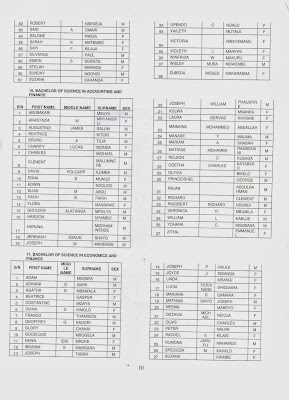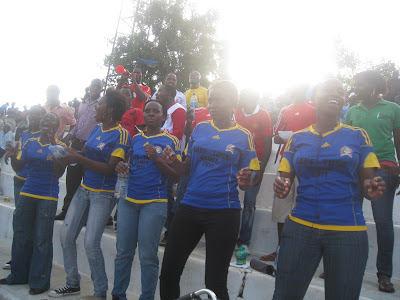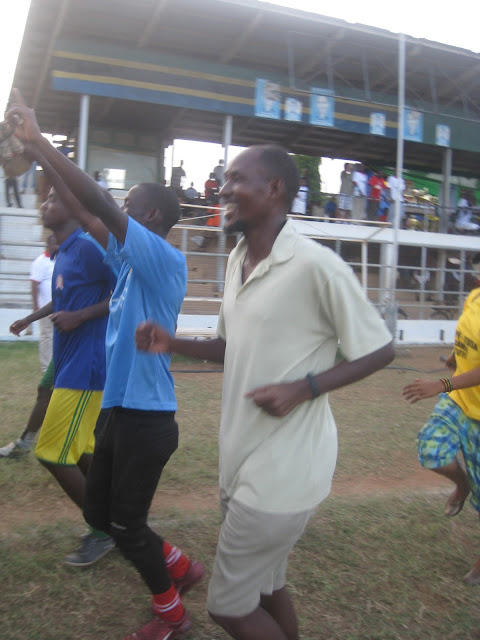In the liberal theory, the constitution is both a power – map as well as a terrain of constructing political legitimacy. In this case, a constitution is not only a fundamental legal but primarily a political document. In other words, the rulers (the executive) derive both the exercise of power and its legitimation from the Constitution.
The making and application of the constitution does not only signify the putting in place a certain constitutional and legal structure, but the process of constructing consensus; that is, making the political rule and the exercise of power acceptable and respectable.
Legitimacy can be defined simply as the quality of right to rule, and a legitimate regime is one whose subjects accept its right to govern.
The value of legitimacy is that, such a regime need not maintain itself primarily by force. History suggests that governments founded on force are unstable and short – lived. Their fragile equilibrium encourages increasing resort to repression, which inhibits constructive effort both by government and the governed.
Democracy, good governance and constitution are three inseparable institutions with symbiotic relationship in society, short of this will result in crisis of governance.
This raises the question as to the nature of the constitution we need at the moment. Firstly, it should be a constitution which acknowledges the irresistible pressure for change inherent in human society. Change is nurtured by ideas and man’s desire for justice and freedom. The constitution should not interfere with these basic developments. People must have the ultimate say.
Secondly, the constitution should honestly define “ab initio” its own boundaries, implicitly and explicitly as a human document. It should not elevate itself to building castles in the air by arrogating to its unattainable powers and attributes.
This is why, for obvious reasons, the question regarding the need for a new constitutional dispensation and electoral system continues to raise a great deal of passion and heat. Two strands of opinion dominate the national debate:
On the one hand, there is a view that our country has quite successfully gone through multi-party elections based on the constitution and the electoral law as they presently exist, therefore there is no need to review or write a new constitution. Proponents of this view argue that what is required is just incremental improvements on the existing framework, as opposed to throwing it out of the window and starting all over, may be more practical approach to take.
The opposing view premised on the recommendations of the Nyalali Commission, holds that, the underlying value systems which underpin the present constitution and electoral law suffer from deep – seated one party cultural and ideological trait.
This debate is not only interesting, but it goes to the root of our new organized pluralism. We can argue for or against the need for a new constitution and a new electoral law. What is not debatable, however, is that a new political reality has dawned on our nation; namely that the traditional concept of democracy anchored in representativeness through political parties inside and outside electoral organs is inadequate and outmoded.
We believe that, social movements within our civil society have an important task of influencing the extent and nature of social, economic and political change in our country.
A viable civil society can be defined as a non-political organization which is capable of carrying out its responsibility under the terms of the objectives for which it is established. The basic human problems, such as poverty, health, education, shelter, environment and the method of dealing with these problems should not be allowed to fall into the hands of the government alone. It is just as wrong for the government to assume sole responsibility for the people’s welfare as it is for civil leaders to abandon their social responsibility to the communities.
Viable civil leaders and societies operate with emotional and intellectual commitment to their cause. They would form pressure groups to ensure that whatever has to be done by the state is actually done and vice-versa.
Viability of civil society in any country is driven by dialogue of the people. In fact, dialogue is the essence of the democratic process. But it is a dialogue based on voluntarism. In other words, it is a dialogue that widens the arena of politics beyond electoral and legislative politics which the latter, have led to a virtual exclusion of the masses.
But even at the broader societal level, our country needs an engaged community of thinking citizens. Unfortunately, what multi-party politics is doing now, as it were during the one-party politics, is to reduce politics to the number of parties and the number of votes.
It is for this reason that such politics are elitist in character, since their assumption is that people do not and are incapable of thinking, and therefore, they must be represented; and further that, people are incapable of making their own history, that it is only the parties and the state which are capable of doing so. Here the attempt is to even deny (and we have abolished) the existence of politics outside the parties.
Indeed, it is high time now to think beyond current party politics. Is it possible for parties which are organically linked to the working people to emerge? What mode of politics will make such a possibility a reality? These are some of the questions which remain hanging, given the current political liberalization.
One of the tragedies of our political transformation is that our country still suffers from very strong political impulses and even illusions conditioned by priorities of our polity as it is rather than it ought to be. Whether it be over socio-economic issues, politics or the constitution, we seem to lack the mindset and the courage to dare and to accept change; not change for its own sake, but change for a better dispensation.
In my view, fundamentalist beliefs, of whatever origin or character, always foreclose honest and genuine debate and dialogue and therefore, the anti-thesis of democracy. The tendency to view any challenge or criticism against a political party or the government in power by a honest citizen as anti-party or anti-government, and therefore he or she must be ridiculed, does not create a healthy climate for democracy and good governance.
Change is the litmus test for democracy. Even Mwalimu Julius Nyerere, who had believed that change “causes disturbances” and upsets stability, was also quick to admit that stability itself was impossible to achieve without change (Read, Nyerere: Stability and change in Africa).
And this is the challenge which must form genuine democratic debate about a new constitution and electoral law in our country today.
The constitution is the fundamental law of the country. Our country’s development is importantly influenced by the nature and content of the constitution.
The importance of these two legal pinnacles of our country demands that they be put to public scrutiny. Hence, political systems need to be understood by the people (the Civil Society) they serve and be suited to their own value systems.
Periodic elections, however free and fair, are insufficient criteria for pursuing genuine development, and that, it is the continual questioning of citizens, whose freedom of expression must be total to stimulate the reforms essential for maintaining the country’s democratic effectiveness as the society transforms.
A constitution is at its best if it is the product of a social change, ushering in for the people a fresh breath of life, fresh ideals, and a sense of destiny: and if only it is inspired by intelligent, conscientious, far-sighted leaders, visionary of the highest order.
The constitution, when made under such favourable conditions, when the nation is in a confident, triumphant mood, becomes an embodiment of the natural will of the people, the consensus of the nation, and acquires an enduring value.
We must move away from politics of confrontation and polarization to politics of consensus. The challenging starting point is for Tanzanians, leaders and followers alike, to jettison their shibboleths and illusions about the need for a comprehensive, as opposed to an incremental, constitutional and electoral reform.
The sad story about multipartism today is that the existing and the emerging parties, without exception, have confined themselves to the realm of fighting to remain in or to enter the State House. As far as popular politics are concerned, the broad masses are only mobilized for support, knowingly or blindly.
This type of democracy does not address itself to the issues of redressing imbalances, inequalities, exploitation, etc, and all the talk is about capturing state power, no less, no more. Clearly, multi-party politics is still imprisoned in the state controlled conception of politics.
In fact, political liberalization which continues currently is taking the form of another monopolization of political participation by very narrow circles of elites. This process is also increasingly accompanied by further weakening of the civil society’s organizational capacities. This is because it does not preclude the dominance of state repressive relations to the civil society.
The advent of pluralism and of market economy have, moreover, brought to the fore new challenges which the legal regime has to respond to. Take the case of corruption: this cancer is not only destroying the moral fabric, it is also undermining our very democratic institutions. Corruption, at social, economic and political levels stems from the resort to unprincipled means and abuse of administrative authority. We must thus quickly move towards an environment where corruption, inefficiency and lack of accountability by every citizen and leaders are effectively checked and sanctioned through legal means.
There is no democracy in a corrupt state. Here, democracy is seen just as a form of rule which includes the right of representation only. It is a matter of the ballot box, and it does not matter what means one uses to get the votes. This is what is taking place in our country today, where political corruption has been legalized, making leadership the right only of the worthy, backed by a discriminative electoral law.
Democracy as a process of transforming the state, requires one to focus on the politics of social and political emancipation of the people. It is necessary to deal with issues such as; in which way is production organized? Who is producing? Who is appropriating the surplus? What forms of accumulation are taking place – in sum the relations of subordination and resistance at the level of production?
It is therefore imperative now, that our nation must resolve to take the ultimate decision as to what constitution she needs on her own without involvement of external forces or interests.
We want a constitution that puts the nation’s interests above all other in a spirit of realism, in which problems, obstacles and possibilities are assessed in their true nature. The legitimacy of the constitution shall derive solely from its acceptance as a writ of accord as to how the people want to be governed and how they want to co-exist in the spirit of harmony, cooperation and reciprocal obligations.
The constitution must view the nation as a trust. Under this principle, it is enjoined that the nation herself should be treated as a trust to be managed well with all sense of responsibility so that she can provide all that her people need in terms of happiness, comfort and decent living and at the same time be healthy enough to meet the needs of the generations to come.
Under this principle is the connotation that, society is the primary owner of all natural resources, in which, consequently, all people have equal rights of access.
Constitutional provisions are also needed to institutionalize a coordinated national strategy to preserve nature and environment. There is an inseparable link between man and nature and therefore, misuse of or abuse of nature must be made a serious breach of the constitution.
Policy makers must be made to understand that, the constitution we advocate for is not one for CUF, CHADEMA, CCM or TLP, nor shall it be meant to satisfy interests of political heavyweights. Rather, the constitution we want shall be for all the people – politicians and non-politicians and the civil society in general.
Democratic elections make governments more accountable to the people. We need electoral laws that will facilitate smooth elections that will be free and fair, instead of encouraging violence, corruption and use of state organs in the electoral process, hence defeating the whole idea of integrity, transparency and good governance.
Any one seeking a legal remedy in elections should be enabled to knock on the doors of justice and be heard without unnecessary restrictions, like depositing 5m/-, or to cry for mercy and discretion of the court.
Indeed, we must now all come forward with the will, creativity and a readiness to struggle for the required transformation through the desired constitutional means.
Source:http://www.thisday.co.tz/?l=11018 (accessed on 8 Sept 2013)



































